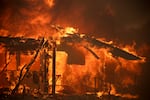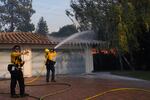
Flames engulf a structure during the Mountain Fire Wednesday, Nov. 6, 2024, near Camarillo, Calif.
Ethan Swope
California was lashed by powerful winds Wednesday that fed a fast-moving wildfire, which destroyed dozens of homes and forced thousands of residents to flee as forecasters warned of the potential for “extreme and life-threatening” blazes.
Northwest of Los Angeles, the Mountain Fire exploded in size and prompted evacuation orders for more than 10,000 people as it threatened 3,500 structures in suburban communities, ranches and agricultural areas around Camarillo, according to a statement from Gov. Gavin Newsom. He said he has requested federal assistance for the area east of the Pacific coast city of Ventura.
A thick plume of smoke rose hundreds of feet into the sky, blanketing whole neighborhoods and limiting visibility for firefighters and evacuees. The fire grew from less than half of a square mile to 16 square miles in little more than five hours.
Several people were injured and taken to hospitals, the Ventura County Fire Department said, but it was not immediately clear how they got hurt.
Related: Important wildfire terms and their definitions
The erratic winds and limited visibility grounded fixed-wing aircraft, and gusts topped 61 mph, said weather service meteorologist Bryan Lewis. Water-dropping helicopters were still flying.
Aerial footage from local television networks showed dozens of homes in flames across several neighborhoods as embers were whipped from home to home. Other footage captured horses trotting alongside evacuating vehicles.

Firefighters work against the Mountain fire Wednesday, Nov. 6, 2024, near Camarillo, Calif.
Marcio Jose Sanchez
Jade Katz, who said she is disabled and does not drive, waited for a friend to pick her up near her Camarillo Heights home with a suitcase full of medication and Bella, her Great Dane service dog, as she watched the neighborhood burn. But the friend couldn’t reach her, so first responders sent a squad car to escort her to safety.
Andrew Dowd, a Ventura County fire spokesperson, said he did not have details of how many structures had been damaged.
Gus Garcia, who owns a ranch south of the fire, said he’s waiting to see whether conditions will change to decide if he should evacuate his horses and cattle. Around 12:30 p.m., his animals were still safe and he was trying to stay out of the way as others got their livestock out.
His ranch is surrounded by others with horses and alpaca, and Garcia said his neighbors in the canyon did not seem panicked.
“The horse community, they prepare for this because it’s always a possibility up here,” he said.
Related: How to defend your home from wildfire
Meanwhile to the south, Los Angeles County Fire Department crews scrambled to contain a wildfire near Malibu’s Broad Beach as authorities briefly shut down the Pacific Coast Highway as flames burned near multimillion-dollar properties. Residents were urged to shelter in place while aircraft dropped water on the 50-acre (20-hectare) Broad Fire. It was 15% contained around 12:30 p.m. with forward progress stopped. Fire officials said two structures burned.
The National Weather Service office for the Los Angeles area amended its red flag warning for increased fire danger with a rare “particularly dangerous situation” label, and officials in several counties urged residents to be on watch for fast-spreading blazes, power outages and downed trees amid the latest round of notorious Santa Ana winds.
With predicted gusts between 50 mph and 100 mph and humidity levels as low as 8%, parts of Southern California could experience conditions ripe for “extreme and life-threatening” fire behavior into Thursday, the weather service said.
Forecasters also issued red flag warnings until Thursday from California’s central coast through the San Francisco Bay Area and into counties to the north, where strong winds were also expected.
Utilities in California began powering down equipment during high winds and extreme fire danger after a series of massive and deadly wildfires in recent years were sparked by electrical lines and other infrastructure. On Wednesday, more than 65,000 customers in Southern California were without power preventatively, and upwards of 20,000 in Northern California.
Wednesday’s fires were burning in the same areas of other recent destructive fires, including the 2018 Woolsey Fire, which killed three people and destroyed 1,600 homes near Los Angeles, and the the 2017 Thomas Fire, which destroyed more than a thousand homes and other structures in Ventura and Santa Barbara counties. Southern California Edison has paid tens of millions of dollars to settle claims after its equipment was blamed for both blazes.